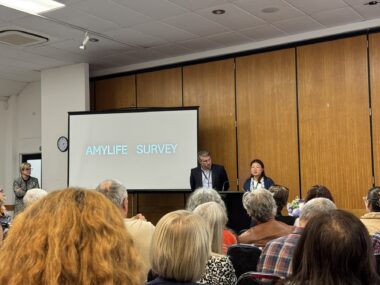Forging relationships at an amyloidosis conference
My late husband would've been pleased to witness this year's event

It’s been nearly a month since the charity I lead, the New Zealand Amyloidosis Patients Association (NZAPA), held a conference for patients and caregivers. The two-day event was made possible by the active participation of those living with various types of amyloidosis, including hereditary ATTR (hATTR), wild-type, and AL (amyloid light chain, or primary amyloidosis).
We were thrilled that attendance exceeded our expectations, with more than 80 people turning up despite only 65 registering. Attendees had the opportunity to listen to varied experts discuss the management of their condition.
NZAPA held its inaugural conference in 2021. Back then, my late husband, Aubrey — who passed away in May 2022 from complications of hATTR amyloidosis — was still alive and able to participate in meetings with other patients. Before we founded the organization, those diagnosed with amyloidosis in our country often had to manage the condition without much involvement from doctors — primarily because of a lack of treatment options and disease awareness.
But a patient group allows relationships to form — especially in person at conferences — and reminds those with the condition that they’re not alone.

Jaime Christmas presents at the 2025 NZAPA conference. (Photo by Joshua Christmas)
Aubrey would have been pleased to see the success of this year’s conference. He always believed in the power of connection and support among patients. His passionate advocacy for awareness and education made a lasting impact, and I know he’d be proud of how far we’ve come.
Despite the lack of publicly funded drugs for ATTR amyloidosis in New Zealand, patients continue to hold on to hope that effective treatments will become available and accessible. In the meantime, they remain optimistic and proactive, focusing on managing their health through careful attention to diet and exercise.
In addition, the New Zealand clinicians who are involved in amyloidosis care are advocating for greater disease awareness among their peers, contributing to a growing understanding of the condition.
The expert physicians who attended and spoke at our conference were incredibly supportive, offering valuable insights and fostering a sense of hope among the participants. Their willingness to engage with attendees and share their expertise not only empowered those in the room, but also illustrated the strong collaboration between patients and healthcare professionals. It was a testament to the community we’ve built and our shared commitment to improving the lives of those affected by amyloidosis.
Note: FAP News Today is strictly a news and information website about the disease. It does not provide medical advice, diagnosis, or treatment. This content is not intended to be a substitute for professional medical advice, diagnosis, or treatment. Always seek the advice of your physician or other qualified health provider with any questions you may have regarding a medical condition. Never disregard professional medical advice or delay in seeking it because of something you have read on this website. The opinions expressed in this column are not those of FAP News Today or its parent company, Bionews, and are intended to spark discussion about issues pertaining to familial amyloid polyneuropathy.






Leave a comment
Fill in the required fields to post. Your email address will not be published.